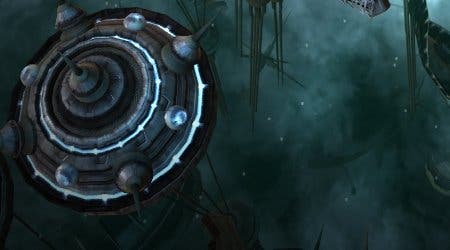Fusion: Genesis
Genre blender.
You can't move for twin-stick shooters or Diablo clones on Xbox Live Arcade, but a twin-stick shooter/dungeon crawler with MMO sensibilities? Now there's something to get excited about.
It's also something to get confused and a little bewildered about, at least at first. You can't really fault first timers Starfire Studios for their ambition, though; its game Fusion: Genesis is a striking blend of disparate parts that, surprisingly, hangs together brilliantly well. It's a game that's as unique as its title is bland - and while the studio behind it might be new, it helps that the talent behind it is a little more experienced.
Step forward Phil Dunne and Chris Tilston who, alongside two other colleagues, decided to leave behind their previous employers Rare and move to the nimbler, riskier yet more creatively fulfilling world of Xbox Live Arcade.
"We had a good run at Rare, a happy run at Rare," admits Tilston, "When you know it's your time to move on, it's your time. It is definitely a great place to work at and for all intents and purposes still is. But they're obviously into big, 50, 100 man games and they're a 160 man company - so you're a one game company in a way."
The four had already worked on an Xbox Live Arcade game before - although they're unfortunately not at liberty to disclose exactly what it was - and witnessing the freedom such a project introduces was enough to whet their appetites. "It was just really fun getting back in a small team sense," says Tilston, "where everybody is touching more parts of the game. There's a lot more creative input."
"And there's faster iteration on the creative process," agrees Phil, "You can come up with an idea for a design for a ship or whatever, and you get to do it pretty much the next day, and start working on it. The feedback loop is a lot quicker and there are a lot less people to get involved with it. It's just a bit more satisfying in some ways."
Having struck it alone, Starfire decided on a path less travelled for an upstart studio. "It would be great to do an MMO," says Tilston, "That was what we'd played and we'd actually done some research. We'd actually done some stuff like that when we were at Rare.
One question's immediately apparent, and it's one that didn't escape Starfire. "How do we make this with such a small team?" asks Tilston, "We've got to control the scope of the graphics, of the content, and space is obviously a good setting. And a top down shooter, we thought, well, we can knock out the graphics for this in a decent amount of time."
That explains at least part of Fusion: Genesis' make-up then. As a twin-stick game it's generic but professionally handled - a slick frame rate that doesn't look to drop below 60 fps lends Fusion: Genesis the fidelity of an arcade shooter, which makes it all the more surprising when you realise that it most definitely isn't.




.png?width=291&height=164&fit=crop&quality=80&format=jpg&auto=webp)




.jpg?width=291&height=164&fit=crop&quality=80&format=jpg&auto=webp)
